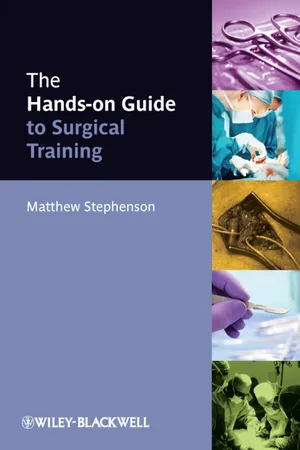
- English
- ePUB (mobile friendly)
- Available on iOS & Android
The Hands-on Guide to Surgical Training
About This Book
Thinking about a surgical career? About to start surgical training? Do you know what to expect and how to thrive?
The Hands-on Guide to Surgical Training is the ultimate, practical guide for medical students and junior doctors thinking about taking the plunge into surgery, and also for surgical trainees already in training. It's full of invaluable, practical information and career guidance to ensure you get the most out of your surgical career.
It offers general guidance and advice on surgical training, together with detailed information on each of the nine surgical subspecialties, each written by seniors and consultants, as you make both clinical and career-based choices.
Undoubtedly one of the most comprehensive resources for surgical trainees available, The Hands-on Guide to Surgical Training will be essential reading throughout your training and surgical career.
Take the stress out of surgical training with The Hands-on Guide!
Frequently asked questions
Information
PREOPERATIVE ASSESSMENT
Table of contents
- Cover
- Title page
- Copyright page
- Preface
- Introduction
- Contributors
- So you want to be a surgeon?
- Abbreviations
- Clinical
- Non-clinical
- Appendix 1 PREOPERATIVE ASSESSMENT
- Appendix 2 CONSENT
- Appendix 3 LOCAL ANAESTHETICS
- Index